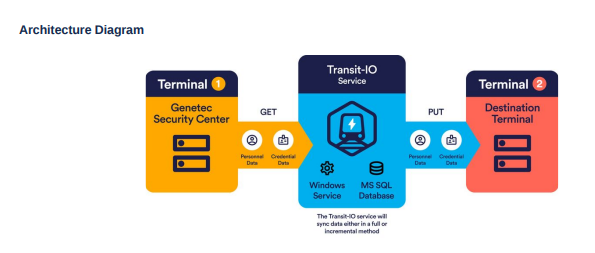

Synchronizes cardholders and credential data from a supported Genetec Security Center system to a supported Transit-IO destination Terminal.
Jump to
Availability
- Americas
- Asia Pacific
- Europe
- Middle East And Africa
Product line
- Security Center
Octeum Transit-IO Genetec Terminal Solution Overview
Synchronizes cardholders and credential data from a supported Genetec Security Center system to a supported Transit-IO destination Terminal.
Key market application
Mobile credentialing synchronisation
- A global touchless access provider chose Octeum as its preferred certified-by-manufacturer solution to synchronize identities and credentials from Genetec Security Center to its cloud credential server.
Data sync between PACs
- Multiple corporations with two or more separate PAC systems have turned to Octeum to automatically and securely replicate identity and credential data. With Transit-IO, we can replicate data seamlessly between several different PACs.
System migrations
- When you need to migrate identities, credentials, hardware and access from one PAC to another, Transit-IO is the software solution that's efficient, secure and error-resilient.
HR and Active Directory feed
- Transit-IO is the right solution when your organization needs to take a data source of truth and move it to or between any of our supported terminals.
Features and benefits
Transit-IO is a transportation system for moving people (cardholders) and credential data from a source (Genetec Security Center) to a destination (any supported Terminal). It moves your security data between platforms, or terminals, at any necessary intervals. This is useful for easily integrating a Genetec Security Center system with other platforms -- AD, HR, databases, .CSV files, other physical access control systems, key management systems, or mobile credentialing systems.
Solution Architecture
The Octeum Transit-IO Genetec Terminal leverages The Genetec Web API to make all calls for synchronizing data to a destination system.
- a Windows service is used to run all jobs necessary for synchronization.
- a Microsoft SQL Server database is used to store data necessary for this solution.
See The Architectural diagram below :
